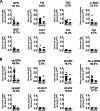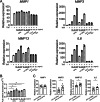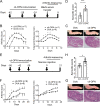Identification of anti-citrullinated osteopontin antibodies and increased inflammatory response by enhancement of osteopontin binding to fibroblast-like synoviocytes in rheumatoid arthritis
- PMID: 36804906
- PMCID: PMC9936655
- DOI: 10.1186/s13075-023-03007-9
Identification of anti-citrullinated osteopontin antibodies and increased inflammatory response by enhancement of osteopontin binding to fibroblast-like synoviocytes in rheumatoid arthritis
Abstract
Background: Anti-citrullinated protein/peptide antibodies (ACPAs) are present in patients at onset and have important pathogenic roles during the course of rheumatoid arthritis (RA). The characteristics of several molecules recognized by ACPA have been studied in RA, but the positivity rate of autoantibodies against each antigen is not high, and the pathogenic mechanism of each antibody is not fully understood. We investigated the role of anti-citrullinated osteopontin (anti-cit-OPN) antibodies in RA pathogenesis.
Methods: Enzyme-linked immunosorbent assays on RA patients' sera were used to detect autoantibodies against OPN. Fibroblast-like synoviocytes (FLS) isolated from RA patients were used to test the binding activity and inflammatory response of OPN mediated by anti-cit-OPN antibodies, and their effect was tested using an inflammatory arthritis mouse model immunized with cit-OPN. Anti-cit-OPN antibody positivity and clinical characteristics were investigated in the patients as well.
Results: Using sera from 224 RA patients, anti-cit-OPN antibodies were positive in approximately 44% of RA patients, while approximately 78% of patients were positive for the cyclic citrullinated peptide (CCP2) assay. IgG from patients with anti-cit-OPN antibody increased the binding activity of OPN to FLSs, which further increased matrix metalloproteinase and interleukin-6 production in TNF-stimulated FLSs. Mice immunized with cit-OPN antibodies experienced severe arthritis. Anti-cit-OPN antibodies in RA patients decreased the drug survival rate of tumor necrosis factor (TNF) inhibitors, while it did not decrease that of CTLA4-Ig.
Conclusions: Anti-cit-OPN antibodies were detected in patients with RA. IgG from patients with anti-cit-OPN antibodies aggravated RA, and anti-cit-OPN antibody was a marker of reduced the survival rate of TNF inhibitors in RA patients.
Keywords: Anti-citrullinated protein antibody; Citrullination; Integrin; Osteopontin; Rheumatoid arthritis.
© 2023. The Author(s).
Conflict of interest statement
The Department of Advanced Medicine for Rheumatic Diseases is supported by Nagahama City, Shiga, Japan, Toyooka City, Hyogo, Japan, and five pharmaceutical companies (Mitsubishi Tanabe Pharma Co., Chugai Pharmaceutical Co. Ltd, UCB Japan Co. Ltd, Asahi Kasei Pharma Corp., and AYUMI Pharmaceutical Co.). This study was conducted as an investigator initiated the study. These companies had no role in the design of the study, the collection or analysis of data, the writing of the manuscript, or the decision to submit the manuscript for publication.
All authors have declared no conflict of interest.
Figures





References
-
- Kawahito Y, Morinobu A, Kaneko Y, Kohno M, Hirata S, Kishimoto M, Seto Y, Sugihara T, Tanaka E, Ito H, et al. Drug treatment algorithm and recommendations from the 2020 update of the Japan College of Rheumatology Clinical Practice Guidelines for the Management of Rheumatoid Arthritis-Secondary Publication. Modern Rheumatol. 2022;33(1):21–35. doi: 10.1093/mr/roac017. - DOI - PubMed
-
- Smolen JS, Landewé RBM, Bijlsma JWJ, Burmester GR, Dougados M, Kerschbaumer A, McInnes IB, Sepriano A, van Vollenhoven RF, de Wit M, et al. EULAR recommendations for the management of rheumatoid arthritis with synthetic and biological disease-modifying antirheumatic drugs: 2019 update. Ann Rheum Dis. 2020;79(6):685–699. doi: 10.1136/annrheumdis-2019-216655. - DOI - PubMed
Publication types
MeSH terms
Substances
LinkOut - more resources
Full Text Sources
Medical
Research Materials

